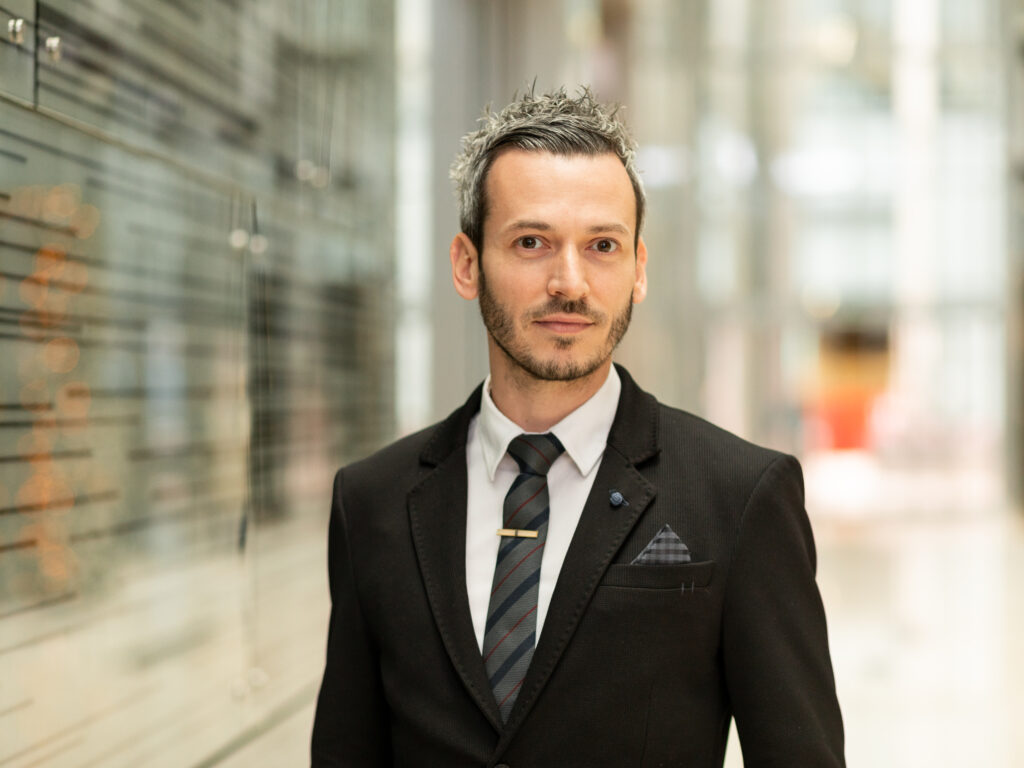
In our continuing education series, we spoke to Jean-Philippe ‘JP’ Vergne, Associate Professor at University College London (UCL)’s School of Management.
JP examines the evolution of capitalist societies since the early 17th century. Among his award-winning areas of research is the study of the rise of blockchain-powered organizations, and he routinely teaches aspects of blockchain to students studying a range of management issues.
UCL is home to the world-leading UCL Centre for Blockchain Technologies, and during the interview, we spoke to JP about how the institution retains its global pre-eminence in the crypto sector, the importance of partnerships, and why the decisions that UK regulators make in coming months are so vital to the future of the country’s fintech sector.

UCL has created a niche in blockchain. How has it done this and how does it maintain its edge?
Early efforts started in 2015 with the creation of the UCL Centre for Blockchain Technologies, which has been very successful in creating the basis for UCL’s reputation in the space.
What’s interesting with this initiative is that it cuts across the university’s faculties and departments. As such, it was able to grow quite fast, and now has at least a couple of hundred research and industry associates across the world.
Its most recent initiative – the DLT Science Foundation – was set up at the start of June, and is focused on boosting the efforts of the centre, particularly with industry, stakeholders and regulators.
How receptive were other departments towards an interdisciplinary approach to crypto?
I wasn’t there at the start because I was setting up a research centre in Canada in 2014, but I can bet that scepticism was there. The scepticism wasn’t related to mono-discipline versus interdisciplinary; it just came from being about crypto.
There was just massive scepticism – and there’s still some today – but at the time, just doing anything around crypto in a university was a challenge in itself. Often convincing others to join has actually seemed like the easier challenge.
These initiatives that were set up eight, nine, ten years ago, had a slow start but I think in recent years, the projects that were set up earlier have really accrued the benefits from being early movers, and that’s what happened with UCL.
Being in the right place, being early, and growing earlier and faster than other universities, creates a solid advantage.
Talking of challenges, what’s been the impact of the recent problems the sector has faced?
University researchers, whether from computer science, management or other disciplines, didn’t wait for the scandals to hit the news to understand that a crypto industry designed like the Wild West without any rules was bound to fail. We’ve known that for years.
The UCL centre started working with regulators a long time ago and the sector’s challenges haven’t changed our approach as researchers to the industry.
I think what has changed is the willingness of regulators to engage with us. In my experience, the first regulatory agencies that were very keen to work with researchers were the central banks because in Western countries they were the early movers in terms of researching the possibility of establishing a central bank digital currency using blockchain technology.
Other types of regulators were much, much slower. As a result of the recent scandals, they are now reaching out to universities and collaborating on projects, and I think they’re particularly interested in students coming from computer science, business and organizational design, as well as people with a legal background.
When you’re putting together a course, how do you decide what to include?
It really depends on the primary audience. I don’t believe a general ‘Introduction to Blockchain’ course, at this point, makes much sense given how mature the industry has become. You just have to choose one perspective and dig deeper into that.
Students get to choose multiple courses across departments and faculties, and build their own customized curriculum depending on their career goals. And I think that’s a strength.
The blockchain content I offer as part of a management course will be different to one that was initially designed for computer science students and offered by the computer science departments.
The way I teach is to incorporate blockchain content into traditional business topics. For instance, last Fall, I taught a business strategy course, a significant chunk of which was about companies operating as part of the digital economy. My approach to blockchain was how can companies, entrepreneurs and protocols leverage blockchain technology to create new kinds of competitors facing Amazon, Google, Facebook, TenCent etc. I made sure that the students understood enough about blockchain technology so they could then understand how it can change patterns of competition.
What sort of students does UCL attract?
Students are exposed to blockchain in many different ways and come for a variety of reasons.
We don’t get a lot of general students who simply want to know something about blockchain. Our students are people that are really invested in actually channelling and developing a career path already.
Sometimes their needs are industry specific. I had a couple of students wanting to work in luxury fashion brands or luxury companies that sell watches and jewellery. They have been using blockchain technology to track the provenance of their goods, to authenticate their goods or to fight counterfeiting. They wanted to learn more about blockchain and the intersection of business strategy with that particular industry.
Another small group of students wanted to work in sports management. They’d read about how different teams had used blockchain. For instance, the NBA issues the 21st century equivalent of ‘baseball cards’ using NFTs, and as a result, the students were really interested in the potential for blockchain technology to reshape the way we do marketing with NFTs and engage with consumers in the sports industry.
We have students who are finance-oriented, wanting to learn how to trade cryptocurrency assets because they want to be a trader. It’s a very different crowd.
Do you think that crypto will get to the point where it touches every career?
I think it’s already there in certain functions. You’re seeing it, it’s happening, but I don’t think crypto and blockchain used as a foundational technology to build platforms from the ground up will change every industry.
Depending on whether you’re working to be a marketer, a legal advisor or an engineer, you may or may not be exposed to blockchain systematically. There will be differences in the specialism and the function.
As a scholar and instructor, I’ve always tried to stick to a healthy balance between curiosity and excitement on one hand, and scepticism on the other. I’ve never been an activist or told my students that blockchain will completely change the world, that everything will be different 10 years from now, because I’ve just never believed that it was going to be the case.
Instead, I’m trying to convey that sense of excitement, but with a lot of caveats. I emphasize areas where blockchain will make a difference and how, but also highlight the areas where it’s probably not going to be particularly useful – at least not in the next 10 or 15 years – so that students know what to expect.
It’s the job of a university not to fall for the latest hype blindly, because everybody wastes a lot of time. We want to prepare the students for the world they will encounter in the next 5 or 10 years. But we don’t want to overstate the latest hype, even if sometimes the students are pushing for it, because it would not be responsible, nor particularly useful for them.
Does UCL differ to elsewhere in how it conducts its blockchain teaching and research?
I think there are a lot of similarities. There’s nothing radically different at UCL. It’s just UCL was an early player in this space. It built an international footprint with multiple partners – academic partners, but also regulators and corporations. Again, it was early doing that and it has given UCL the ability to contribute across disciplines. A lot of universities have this ability, but some business schools don’t have that capacity because they are ‘just’ a business school rather than being part of a university.
Plus, UCL has an advantage in terms of its location in the world’s biggest fintech hub. I think that is a huge advantage and is a huge draw for students.
So, being in the right place, being early, and growing earlier and faster than other universities, creates a solid advantage that UCL has been able to defend, and it remains a big draw for students interested in blockchain because of those advantages.
Is there a network of British universities involved in crypto?
There are two levels of partnering. First, we have partnerships with faculty members at other universities – often partnerships with individual professors more than with the institutions.
For instance, I recently published a research paper on digital blockchain platforms with a colleague doing research at the Imperial College Business School. It’s just a collaboration between people who happen to be at different institutions.
Worldwide, there’s probably about 100 universities that are represented if you look at the research associates who are members of the UCL blockchain network.
But there’s also a more recent layer of partnering at an institutional level in a new initiative called the UK FinTech Academic Network (UKFAN). This involves 12 British institutions who put their resources together to create a network focused on research in the field of fintech, and blockchain in particular.
They are pursuing research and making sure it becomes applicable to, and applied, by corporations and start-ups, while maintaining a healthy dialogue with regulators.
The UK has the talent, the universities, and the funding. It’s also got the fintech fabric in place. The missing piece is regulatory clarity.
How important are international partnerships?
I think it’s very important to have international ties because blockchain has gone through several cycles of regulatory excitement, push back and cancellation, reexamination etc. in various countries. We’ve seen it in China, India, in Canada and now in the US.
Having international ties helps create a perfect hedge and ensures that your network of collaborators is not too heavily dependent on short-term regulatory reactions in particular places, which sometimes are exaggerated.
I think that’s one of the main strengths of UCL’s approach because we’ve been able to be where the action is taking place independently of these short-term, local pushbacks.
Is the UK creating the right type of legislation to support the crypto industry?
It’s not really clear yet what the UK is going to do. What is obvious is that there is an incredible opportunity for the UK to play a major role.
The push back in the US is acting as a deterrent to many investors and start-ups. The EU has made its position clear; for some types of crypto business, it’s great, but for others, it’s not what they are looking for.
The UK potentially now occupies this role as a third party, between the US and the EU, and can use that position to be very strategic about what it wants to do and carve out a niche for itself that could be very attractive for investors and start-ups.
The UK has the talent, the universities, and the funding. It’s also got the fintech fabric in place. The missing piece is regulatory clarity.
I think the regulators in the UK are incredibly smart. They are open, want to understand the situation and really put a lot of effort into researching the sector. So, I think there’s an incredible opportunity.
Is it true that the UK is good at educating people in this sector, but not so strong at retaining talent?
I think the UK is a specific case because its universities rely heavily on foreign students by design. Sometimes I teach classes in which there are no British students. That never happened to me when I was in Canada, France or the US. So, the UK is very special in this respect.
When you have so many foreign students, many will leave when they graduate; they want to go back home, and sometimes they don’t have a choice for visa reasons.
So, it may look like the UK is not very good at keeping students, but I think it’s symptomatic of the way in which the higher education sector is structured, and who it is trying to attract.
Whether the blockchain sector will be the same as other sectors or whether it will be better at keeping people in the UK after they graduate will depend on the environment that the regulators and the government create in the next few months.
I think if the government wants to create the right environment in the space, it could well be that a greater-than-average number of students want to stay rather than go back home to work in crypto and blockchain. The conditions are there.




